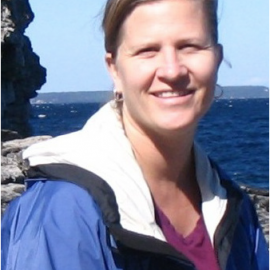Lena Mortensen, Assistant Professor of Anthropology at the University of Toronto, advocates that her students consider the cultural, economic and ethical implications of tourism development, and to think about tourism as a kind of cultural practice in and of itself, one that is shaped by expectations about difference that come from long histories of representing places and peoples.
But she tries not to turn students off of cultural tourism altogether. Lena notes that “one of the most interesting aspects of cultural tourism is that it almost always involves encounters that bring people face-to-face, which, despite the many unequal power relations that sometimes structure these encounters, open up at least a little space for exchanges of a more positive kind.”
Lena received her Ph.D. from Indiana University in 2005, with a specialization in Archaeology and Social Context, a program within the Department of Anthropology that she helped develop together with IPinCH Steering Committee member Julie Hollowell.
Lena’s field research has been conducted primarily in Honduras, and she has published on ethnographic approaches to archaeological work, archaeological tourism, and heritage management specifically as it relates to Copán, an archaeological park and UNESCO World Heritage site in the country’s northwest.
Lena first visited Honduras as an undergraduate student at Cornell University working on an archaeological salvage project in the Sula valley, an area with an incredibly rich history but a very low public profile. As she says, “I found myself wanting to know more about how the people I was working with, the local Honduran staff and crew, thought about the artifacts we were finding and the interpretations we were making; I wondered what relevance archaeological practice and reconstructions had for people who lived in these landscapes or who had intimate connections with these pasts.”
Profile photo at top courtesy of Lena Mortensen, used with permission; above, Copán, Honduras, photo by Juancbg2015 [CC BY-SA 4.0 ], via Wikimedia Commons.
After graduation, Lena interned with a development program in Zimbabwe for a year and a half, working on alternative education initiatives for marginalized youth in the city of Harare. Following this, she was the Education Director of the NGO Cultural Survival, an experience that furthered her interests in Indigenous rights.
These experiences led Lena back to Honduras for her Ph.D., this time as an ethnographer, to study the contemporary contexts and values of the country’s highest profile archaeological site, Copán, a place where the archaeological past meant myriad things: economic development, national symbolism, Indigenous cultural history, and tourism fantasies.
While working with Julie Hollowell on the edited volume Ethnographies and Archaeologies: Iterations of the Past (2009), Lena was invited to join the core research team as the co-chair of IPinCH’s Cultural Tourism Working Group. Lena’s association with IPinCH was a natural fit: both her own research and the rationale for the project is “to take different perspectives on heritage very seriously, and help them find greater voice in policy and practices that affect the way we approach, handle or ‘manage’ all aspects of cultural heritage.”
“I was interested in being part of a larger project that had so many different kinds of committed people working towards similar goals,” she explains, “particularly the goals of more equitable and ethical research practices in the field I feel most invested in.”
In her role as co-chair, Lena is most interested in developing resources for those working towards sustainable, community-based tourism, including Indigenous groups, and in finding ways to empower communities to participate in or create their own programs on terms that meet their community needs.
More recently, Lena’s research has been focused on the implications and effects of ‘culture-branding’ through the intersection of tourism marketing, academic production, public culture forms, and international cultural policy institutions. She is particularly interested in understanding the connections between the ways that archaeological research is highlighted and marketed across different media (magazines, documentaries, popular television, blockbuster exhibitions, etc.), and the kinds of privileged rights people then claim over these over cultural forms.
She continues to maintain an active interest in the ‘heritage politics’ of Honduras, and especially in the ongoing shifts in cultural policy, tourism trends, and funding priorities that work to privilege some histories over others, which then become an important basis on which to negotiate culture-based rights. As Lena says, “It has been exciting to see the increasingly important role that community-based voices and perspectives have to play in resource management.”
Lena’s research on Copán was recently included in an unprecedented volume put out by the Honduran Institute of Anthropology and History, the government agency responsible for the country’s patrimony. Lena believes that the volume, Archaeology and Communities in Honduras (2012, edited by Eva Martinez), has the potential to “speak back to the contexts where this work is hopefully most relevant.”
In her own research and her engagement with the IPinCH project, what continues to drive Lena is the desire to find ways of making those face-to-face tourism encounters, those little spaces of exchange, more beneficial and positive for all involved.
This profile first appeared in the IPinCH Newsletter Vol 4.1 (Winter 2013)







